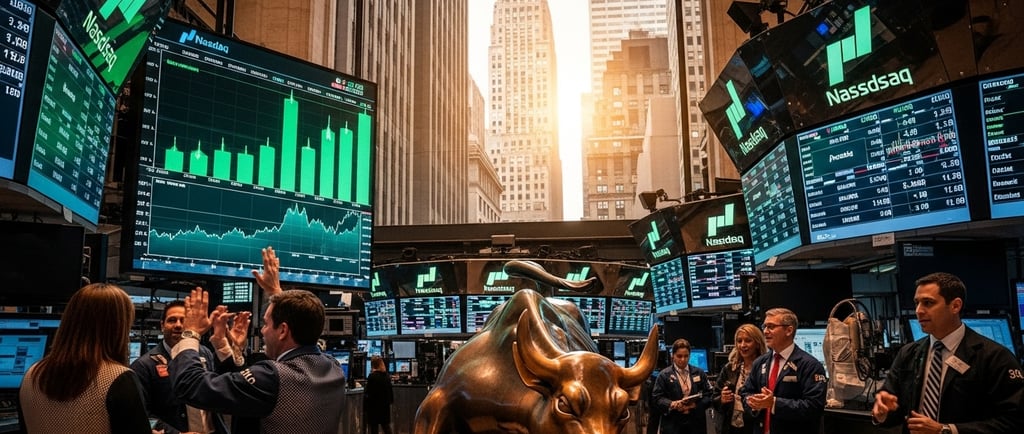NY Stock Markets Close Higher as Nasdaq Hits Record High Despite Trump Tariff Threats
Markets show renewed risk appetite even as President threatens 30% tariffs on European Union
Cristian Ianowich
10/15/20255 min read


Markets show renewed risk appetite even as President threatens 30% tariffs on European Union
Here's something that might surprise you: despite all the tariff drama and trade war headlines, the New York stock markets just closed in positive territory on Monday (July 14th), with the Nasdaq hitting a brand new all-time high.
If you've been worried about how Trump's tariff policies might tank your portfolio, this trading session tells an interesting—and maybe reassuring—story about market resilience.
Let me break down what happened and what it means for your investments.
The Numbers: All Three Major Indices Finish Green
Monday's closing bell brought smiles to Wall Street:
Dow Jones Industrial Average: Up 0.20%, closing at 44,459.65 points
S&P 500: Rose 0.14%, finishing at 6,268.56 points
Nasdaq Composite: Gained 0.27%, reaching 20,640.33 points—a new all-time closing high
Now, these aren't massive gains, but that's not the important part. What matters is that markets pushed higher despite Trump threatening to slap 30% tariffs on European Union products.
That's right—while the trade war headlines got scarier, investors got bolder.
Why Didn't Markets Panic Over EU Tariff Threats?
You'd think threatening tariffs against one of America's largest trading partners would send stocks tumbling, right?
Here's what's actually happening: according to Eduardo Velho, economist at Equador Investimentos, the market's baseline scenario assumes that tariffs will ultimately be reduced compared to the levels mentioned in Trump's July letters.
In other words, investors are betting that Trump's threats are a negotiating tactic, not the final reality.
This is a crucial insight for anyone trading stocks or managing a portfolio. Markets don't always react to what politicians say—they react to what they think will actually happen. Learning to distinguish between political theater and genuine policy can save you from panic-selling at the wrong moments.
Defense Stocks Take Off on Geopolitical Uncertainty
While many sectors showed mixed performance, one area clearly benefited from the heightened tensions: defense and aerospace stocks.
Check out these impressive gains:
GE Aerospace: Up 2.71%
Lockheed Martin: Rose 1.33%
Northrop Grumman: Climbed 1.32%
Why the strong performance? When geopolitical tensions rise—whether through trade conflicts or actual military concerns—defense contractors typically see increased government spending and stronger investor interest.
Boeing also joined the party with a 1.62% gain, though this was partly supported by positive news from India's aviation accident investigation, which so far hasn't found issues with the Boeing 787 Dreamliner involved in the Air India Flight 171 tragedy that killed approximately 260 people.
Understanding sector rotation during times of uncertainty is a valuable skill. When traditional sectors feel risky, money flows to companies that benefit from instability.
Crypto-Related Stocks Surge With Bitcoin Rally
Another big winner on Monday? Cryptocurrency-related stocks, which rode Bitcoin's wave to impressive gains:
MicroStrategy: Jumped 3.78%
Coinbase: Up 1.80%
Robinhood: Rose 1.65%
These moves mirrored Bitcoin's own performance, which renewed its record above $120,000. The cryptocurrency market continues showing strength despite—or perhaps because of—traditional market uncertainties.
For investors interested in crypto exposure without directly buying digital currencies, these stocks offer an alternative way to play the trend. But remember: they tend to be highly volatile and amplify both Bitcoin's gains and losses.
Tech Giant Nvidia Takes a Breather
Not every stock joined the party. Nvidia, the AI chip powerhouse, slipped 0.52% after an incredible run that pushed the company's market value above $4 trillion last week.
This pullback isn't necessarily bad news. After successive record highs, some profit-taking is perfectly normal and even healthy. Investors who rode Nvidia's incredible AI-driven rally might simply be locking in gains.
The real question is whether Nvidia's dominance in AI chips can justify its massive valuation going forward. That's something every investor needs to consider before jumping in at current levels.
Are you positioned to benefit from the AI revolution, or are you chasing stocks at their peaks? Timing matters, and understanding valuation fundamentals helps you avoid buying at the top.
What's Coming This Week: Key Catalysts to Watch
While Monday's session ended positively, investors have two major events on their radar that could shake things up:
1. Earnings Season Under Trump's Tariffs
After strong growth earlier in the year, the first round of earnings reports under Trump's tariff regime is expected to show a dramatic slowdown in profit growth.
Companies will need to explain:
How tariffs are affecting their supply chains
Whether they're passing costs to consumers or absorbing them
What their outlook looks like if trade tensions continue
This earnings season will be crucial for determining whether stocks can maintain their current valuations.
2. Consumer Price Index (CPI) Report
Tuesday brings the Consumer Price Index data, which is expected to show accelerating inflation.
Why does this matter? Because rising inflation could:
Force the Federal Reserve to keep interest rates higher for longer
Reduce consumer purchasing power
Squeeze corporate profit margins
Make bonds more attractive relative to stocks
The CPI report could easily override Monday's optimism if the numbers come in hotter than expected.
The Bigger Picture: Market Resilience or Denial?
Here's the million-dollar question: Is Monday's strength a sign of genuine market resilience, or are investors in denial about the risks ahead?
There are arguments on both sides:
The Optimistic View:
Markets have learned that Trump's threats often exceed actual policy
Strong corporate earnings (before tariff impacts) provide a cushion
AI and technology innovation continue driving growth
Defense and strategic sectors benefit from global tensions
The Cautious View:
Tariffs haven't fully hit corporate earnings yet
Inflation could force painful Federal Reserve actions
Global trade tensions are escalating, not resolving
Valuations remain extremely high by historical standards
The truth? Probably somewhere in the middle. Markets can stay optimistic longer than skeptics expect, but fundamentals eventually matter.
What Smart Investors Should Do Now
Whether you're actively trading or building long-term wealth, here are some key takeaways from Monday's session:
Stay Informed, Not Reactive: Markets didn't crash on tariff news because sophisticated investors look beyond headlines. You should too.
Watch Sector Rotation: Defense, crypto-related stocks, and AI companies are showing relative strength. Understanding these rotations helps you position accordingly.
Prepare for Volatility: With earnings season and inflation data ahead, wild swings are likely. Make sure your portfolio can handle turbulence.
Don't Chase Records: Nasdaq hitting all-time highs is exciting, but buying at peaks can be dangerous. Have a strategy, not just FOMO.
Focus on Fundamentals: Eventually, corporate earnings and economic data matter more than political tweets and tariff threats.
Ready to navigate these complex markets with confidence? The difference between successful investors and everyone else often comes down to understanding market psychology, recognizing when prices reflect reality versus emotion, and knowing how to position for what's coming next—not just reacting to what already happened.
The Bottom Line: Markets Defy Expectations (For Now)
Monday's trading session proved once again that markets don't always do what you expect. Despite legitimate concerns about tariffs, trade wars, and economic slowdown, stocks pushed higher and the Nasdaq hit a record.
But here's the thing: one good day doesn't make a trend. With earnings season just starting and inflation data dropping this week, we could see this optimism tested quickly.
The investors who come out ahead won't be the ones reacting emotionally to each day's news. They'll be the ones who understand the underlying forces, recognize when fear creates opportunities, and know when optimism has gone too far.
Whether the market goes up or down from here, one thing is certain: those who understand why markets move will always have an advantage over those who only watch what they're doing.
